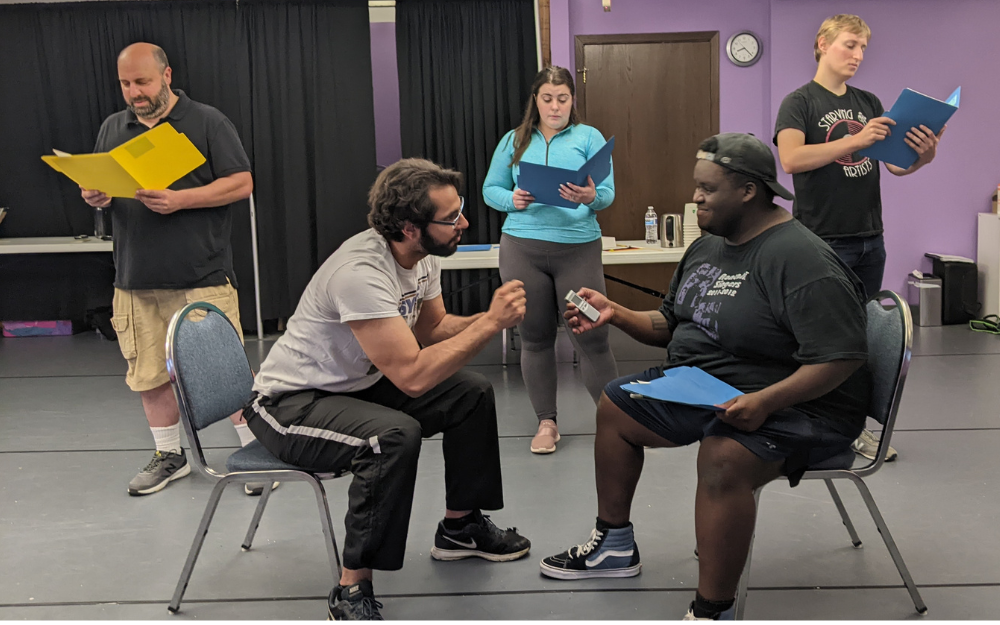
Photos by Meghan Randolph, MTM founder and executive director
(Left to right) Ben Eisenstein, Cat Richmond, Kate Jajewski, Paul Lorentz, Ben Ruyle, Paul Milisch and Kevin James Sievert rehearse for Music Theatre of Madison’s production of “Who’s Your Baghdaddy? Or, How I Started The Iraq War.”
How did President George W. Bush’s administration convince itself and the American public that Saddam Hussein had weapons of mass destruction?
Who’s Your Baghdaddy? or, How I Started the Iraq War explores that question. Music Theatre of Madison’s production of what Playbill calls a “dark, boisterous and irreverent” musical comedy opens this week. The setting is a support group for people who started the Iraq War.
Based on true events that led to the U.S. military’s 2003 invasion of Iraq, “it examines (without explicitly talking about) the rampant Islamophobia and racism that played a major hand in the build-up to this war and the continued U.S. persecution of Muslims and West Asians/North Africans to this day,” said MTM’s associate artistic director Adam Qutaishat.
Qutaishat plays Curveball, the code name of the real-life Iraqi refugee and con man who gave fabricated intelligence about weapons of mass destruction that provided justification for the U.S. invasion. “Curveball is an important person for us all to know about,” especially since his story led to a massive mobilization of soldiers and hundreds of thousands of deaths, Qutaishat said.
Who’s Your Baghdaddy? or, How I Started The Iraq War, directed by Meghan Randolph, opens Aug. 18 and runs through Aug. 26 at Wisconsin Union’s Play Circle Theater at Memorial Union at the University of Wisconsin—Madison. Find more information and purchase tickets here.
UW-Milwaukee Arabic Program Coordinator Fahed Masalkhi will lead a talkback with the audience after the Aug. 20 Sunday matinee performance. He teaches about Islam and geopolitics, as well as about Muslim immigrant life, and serves on the board of the Arab and Muslim Women’s Research and Resource Institute (amwrri.org).
What’s so special about Who’s Your Baghdaddy?
Milwaukee-based music and theatre professional Adam Qutaishat has been “championing this piece for half a decade at least,” he told the Wisconsin Muslim Journal when rehearsals began last month for Music Theatre of Madison’s production of Who’s Your Baghdaddy? or, How I Started the Iraq War. In a recent interview, he explained why. Here are the highlights.

Adam Qutaishat, associate artistic director of Music Theatre of Madison
I started pitching this show to MTM when we were hearing talk about war in Iran. The same thing was happening again. The rhetoric for war was causing us to trust terrible intelligence. It was stirring up hysteria. This is a cycle that needs to be broken. I think creating awareness is one of the ways we start to do that.
Who is Curveball?
Curveball is Rafid Ahmed Alwan al-Janabi. He is the actual Iraqi defector quoted in Colin Powell’s speech to the United Nations and George W. Bush’s State of the Union address. He defected from Iraq and went to Germany. He told them he had worked in a weapons lab in Iraq. It later came out that he had lied about all of it. He was fleeing Iraq, attempting to escape embezzlement and assault charges.
Is Curveball the villain?
What I really like about this musical is it doesn’t cast blame on any one person. What it does is show you how a system full of people could have made a better choice. It forces the audience to reckon with how mundane the road to war can be.
The characters are in a recovery group. Each will say, “I started the Iraq War.” There’s a great level of intimacy with the audience and it is also part of this recovery group. It forces the audience to reckon with what they did or didn’t do or could have done.
This musical comedy is based on a true story. How accurate is it?
I always say that any piece of historical theatre is always historical fiction. For example, in the script, Curveball is a womanizer and a partier. If you read the 2007 book Curveball: Spies, Lies, and the Con Man Who Caused a War, on which the play is based, you see he was opposed to that stuff. And it’s a musical. In real life, he didn’t walk around singing all the time. Some characters are amalgams. And, of course, we compressed the timeline into two hours.
However, it is based on true events and WMJ readers will know many of them. I encourage the audience to come in and enjoy the show, then go out and do their own research. I hope they are inspired to want to learn more about this piece of our history that a lot of people don’t know about.
You mentioned a subtext in this musical is the Islamophobia and racism that created the buy-in for the war from the public. Tell us more about that.
The road to the 2003 invasion of Iraq, right after 9/11, began with this intense national uprising of fear of brown people, Muslims and anybody people felt could have been responsible. The word “terrorist” has come to mean brown people and Muslims. That sort of vitriol came from this era. You see the disregard for humanity in the characters pushing for this war.

(Left to right) Paul Lorentz, Adam Qutaishat, Kate Jajewski, Kevin James Sievert and Ben Eisenstein perform in this satirical musical about true events in the build-up to the 2003 War in Iraq.
It starts with the mundane sort of racism like, “I don’t know how to pronounce your name.” By the second act, it has become more dangerous. Then we find out about all the civilians who died because of it.
Some of the characters start to reckon with some of their unconscious biases and the audience is asked to reckon with theirs. It doesn’t let anyone off the hook. Curveball is not exempt and neither is anyone else.
Performances of this musical comedy are rare. Why is that?
This piece takes a great investment in educating audiences about what it actually is and why it’s important. A lot of people hear the title or listen to the title track and, on the surface, there is a lot of racism. What they don’t understand without the context is that the racist comments (about Arabs) are being made by Curveball, a con man with his own self-interests.

Adam Qutaishat (right) plays an Iraqi refugee and con artist who told German intelligence agent Richart Becker, played by Kevin Sievert (left), he helped engineer weapons of mass destruction for Saddam Hussein’s regime.
There is fear of portraying traditionally marginalized groups of people as imperfect because some feel it gives people in power an excuse to attack them further. But it’s important to tell nuanced stories about real people. It’s so easy, especially in a musical, to label some people as heroes and others as villains, and to moralize. This musical doesn’t do that. It leaves audiences with more questions than answers.
What do you hope the audience takes away from the show?
The first thing is a bunch of good laughs. It’s a really funny piece as well as deeply impactful. The fun helps the audience invest in a way that allows for a renewed commitment to responsibility and accountability. It confronts bystander syndrome, where we always assume somebody else will do the right thing.
The intelligence blunder that led to the Iraq War was the worst we know of. But this wasn’t an isolated incident. It could happen again. So how do we course correct? We go home and interrogate the events and our role in them, and consider what we can do in the future.













